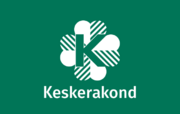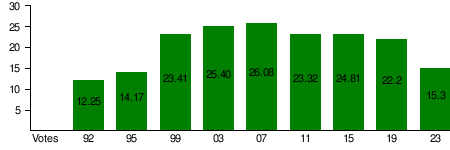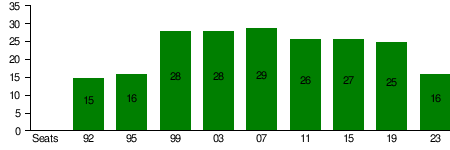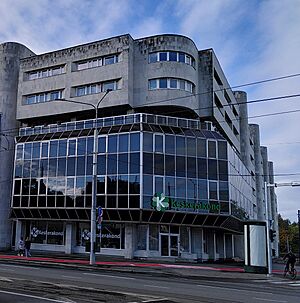Estonian Centre Party facts for kids
Quick facts for kids <div style="padding-top:0.3em; padding-bottom:0.3em; border-top:2px solid Lua error in Module:European_and_national_party_data/config at line 227: attempt to index field 'data' (a nil value).; border-bottom:2px solid Lua error in Module:European_and_national_party_data/config at line 227: attempt to index field 'data' (a nil value).; line-height: 1;">
Estonian Centre Party
Eesti Keskerakond
|
|
|---|---|
 |
|
| Leader | Mihhail Kõlvart |
| Founder | Edgar Savisaar |
| Founded | 12 October 1991 |
| Split from | Popular Front of Estonia |
| Headquarters | Narva mnt. 31-M1, Tallinn 10120 |
| Newspaper | Kesknädal |
| Youth wing | Estonian Centre Party Youth |
| Membership (2024) | |
| Ideology | |
| Political position | Centre |
| European Parliament group | Renew Europe and European Conservatives and Reformists |
| Colours | Green |
| Riigikogu | Lua error in Module:European_and_national_party_data/config at line 227: attempt to index field 'data' (a nil value). |
| European Parliament | Lua error in Module:European_and_national_party_data/config at line 227: attempt to index field 'data' (a nil value). |
| Municipalities |
247 / 1,717
|
| Party flag | |
 |
|
| Website | |
| Lua error in Module:European_and_national_party_data/config at line 227: attempt to index field 'data' (a nil value). | |
The Estonian Centre Party (Estonian: Eesti Keskerakond, EK) is a political party in Estonia. It was started in 1991. The party grew out of the Popular Front of Estonia. Currently, Mihhail Kõlvart is the leader of the party.
The party was formed on October 12, 1991. It was created after several groups left the Popular Front of Estonia. At first, it was called the People's Centre Party. This helped tell it apart from another smaller party. The Centre Party was part of the Alliance of Liberals and Democrats for Europe until September 2024.
Contents
A Look at the Party's History
In the parliamentary elections of March 1995, the Centre Party came in third place. They won 14.2% of the votes and 16 seats in the parliament. They joined the government, and Edgar Savisaar became the Minister of Internal Affairs. Four other party members also became ministers.
Later, the party had to leave the government. This happened because of a situation involving Savisaar. Some members who were unhappy with this formed a new group. Savisaar then became the Chairman of the City Council in Tallinn, the capital city.
In the parliamentary elections of March 1999, the Centre Party did very well. They won the most votes, getting 23.4% and 28 seats. The party has many active groups across Estonia. In 2003, the Centre Party joined the Alliance of Liberals and Democrats for Europe Party.
In 2001, Edgar Savisaar became the Mayor of Tallinn. He was mayor until 2004. In January 2002, the Centre Party and the Estonian Reform Party formed a new government. The Centre Party held 8 minister positions. This government lasted until the elections in 2003.
Even though the Centre Party won the most votes in 2003, they were not in the government. They joined the government again in March 2005. In 2003, most party members did not support Estonia joining the European Union (EU). However, after Estonia joined the EU, the party changed its mind.
In 2004, the Centre Party gained one member in the European Parliament, Siiri Oviir. The party got 17.5% of the votes in those elections. From 2005 to 2007, the Centre Party was part of the government again. They held five minister jobs.
Local elections in October 2005 were very successful for the Centre Party. They won 32 out of 63 seats in the Tallinn City Council. This gave them a strong majority in the city. Many Russian-speaking voters supported the Centre Party.
In the 2007 Estonian parliamentary election, the party received 26.1% of the votes. They won 29 seats, becoming the second largest party in parliament. They were the main opposition party. In 2009, the Centre Party won the most votes in the European Parliament elections. They gained 2 out of 6 Estonian seats.
In local elections in 2009, the party kept its strong majority in Tallinn. In October 2013, the Centre Party and its leader Edgar Savisaar again won a strong majority in Tallinn. They got 53% of the votes and 46 seats.
The Estonian Centre Party did well in the 2015 election. They got 24.8% of the votes and 27 members of parliament. The party remained in opposition. In late 2016, Edgar Savisaar stepped down as party leader. Jüri Ratas was chosen as the new leader.
In November 2016, the Centre Party helped form a new government. This government was led by Jüri Ratas. It was sworn in on November 23.
Parliamentary Elections of 2019
In the 2019 parliamentary election, the Centre Party lost some support. After the election, Jüri Ratas decided to talk about forming a government with Isamaa and the Conservative People's Party of Estonia (EKRE). This decision caused some debate.
Ratas explained that his main goal was to get his party into the government. He wanted to work for the benefit of his voters. He also said the new government would support the EU and NATO. Some important members of the party disagreed with this decision. For example, Raimond Kaljulaid left the party.
Coalition Government (2021–2022)
In January 2021, a new government was formed. It was a big partnership between the Estonian Reform Party and the Estonian Centre Party. Kaja Kallas led this government. However, in June 2022, the Centre Party ministers were removed from the government. A new government was formed without them.
In Opposition (2022–Present)
In the 2023 parliamentary election, the Centre Party received 15.3% of the vote. They won 16 seats in the Riigikogu (Estonian parliament). The party remained in opposition.
After this election, Jüri Ratas decided not to run for leader again. Mihhail Kõlvart, the mayor of Tallinn, ran for leadership. Kõlvart won the election. He became the third leader in the party's history.
In September 2023, Mihhail Kõlvart became the new leader. His win marked a change for the party. They decided to focus more on Russian-speaking voters. As a result, some members, including Jüri Ratas, left the party. This left the Centre Party with fewer members in parliament.
In August 2024, Jaak Madison joined the Centre Party. He said he wanted to make the party a conservative people's party. On September 14, 2024, the party left the Alliance of Liberals and Democrats for Europe Party. They said their views on European cooperation were different.
Party Ideas and Goals
The Estonian Centre Party is often described as a party that supports a social market economy. This means they believe in a market economy but also want social programs. They are seen as a party that aims to represent ordinary people. Their political position is often called centrist or centre-left.
The party has some ideas that might seem different from typical social-liberal views. For example, they have discussed bringing back punishments for having small amounts of illegal substances. Also, party members have different views on same-sex marriage. Historically, the party has been very popular among Russian-speaking citizens in Estonia.
What the Party Stands For
The party says it supports human rights, fairness, and freedom. They want a strong and well-run country. They also believe in making decisions based on facts.
Economic Policy
The party's goal is to create a strong middle class in Estonia. They say they are a "middle class liberal party." They want to keep the minimum wage steady. They also aim to reduce the gap between rich and poor. They plan to do this by investing in weaker economic areas. They also want to train workers and change the tax system.
Cultural Policy
Even though many non-Estonian voters support them, the party supports the Estonian language. They see it as key to Estonian identity. However, they also believe in respecting different ethnic and language groups. They were the only party to vote against a change that would take away the right of non-citizens to vote in local elections. This change mostly affected Russian citizens and people without a country living in Estonia.
Social Policy
The party supports creating social programs. These include social housing and help for single parents. They also support strict rules on immigration.
European Representation
The Estonian Centre Party currently has two members in the European Parliament. One is part of the Renew Europe group. The other is in the European Conservatives and Reformists Group. In the European Committee of the Regions, the party is part of the Renew Europe CoR group.
Party Leaders
- Edgar Savisaar (1991–1995)
- Andra Veidemann (1995-1996)
- Edgar Savisaar (1996-2016)
- Jüri Ratas (2016–2023)
- Mihhail Kõlvart (2023–)
On September 10, 2023, Mihhail Kõlvart was chosen as the party leader. This happened at a special meeting in Paide. He won with 543 votes.
Election Results
Parliamentary Elections
| Election | Leader | Votes | % | Seats | +/– | Status |
|---|---|---|---|---|---|---|
| 1992 | Edgar Savisaar | 56,124 | 12.25 (#3) |
15 / 101
|
New | Opposition |
| 1995 | 76,634 | 14.17 (#2) |
16 / 101
|
Coalition (1995) | ||
| Opposition (1995-1999) | ||||||
| 1999 | 113,378 | 23.41 (#1) |
28 / 101
|
Opposition (1999–2002) | ||
| Coalition (2002–2003) | ||||||
| 2003 | 125,709 | 25.40 (#1) |
28 / 101
|
Opposition (2003–2005) | ||
| Coalition (2005–2007) | ||||||
| 2007 | 143,518 | 26.08 (#2) |
29 / 101
|
Opposition | ||
| 2011 | 134,124 | 23.32 (#2) |
26 / 101
|
Opposition | ||
| 2015 | 142,458 | 24.81 (#2) |
27 / 101
|
Opposition (2015–2016) | ||
| Coalition (2016–2019) | ||||||
| 2019 | Jüri Ratas | 129,618 | 23.10 (#2) |
26 / 101
|
Coalition (2019–2022) | |
| Opposition (2022–2023) | ||||||
| 2023 | 93,254 | 15.28 (#3) |
16 / 101
|
Opposition |


European Parliament Elections
| Election | List leader | Votes | % | Seats | +/– | EP Group |
|---|---|---|---|---|---|---|
| 2004 | Vilja Toomast | 40,704 | 17.53 (#2) |
1 / 6
|
New | ALDE |
| 2009 | Edgar Savisaar | 103,506 | 26.07 (#1) |
2 / 6
|
||
| 2014 | 73,419 | 22.4 (#2) |
1 / 6
|
|||
| 2019 | Yana Toom | 47,799 | 14.39 (#3) |
1 / 7
|
RE | |
| 2024 | Mihhail Kõlvart | 45,767 | 12.43 (#5) |
1 / 7
|
See also
 In Spanish: Partido del Centro Estonio para niños
In Spanish: Partido del Centro Estonio para niños
- List of political parties in Estonia
 | Claudette Colvin |
 | Myrlie Evers-Williams |
 | Alberta Odell Jones |


